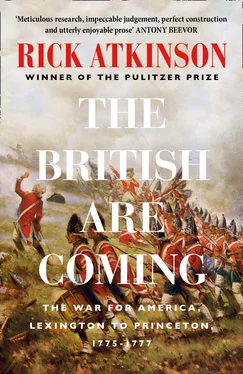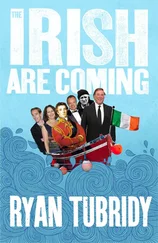Americans by the hundreds surged through the gantlet of naval gunfire still scything the only exit from the peninsula. Some died within yards of safety, including Major Andrew McClary, one of Stark’s Hampshiremen, hit with a frigate cannonball. “He leaped two or three feet from the ground, pitched forward, and fell dead upon his face,” an officer reported. But most straggled unharmed onto the high ground beyond the Neck, exhausted and tormented by thirst. General Putnam followed on his white horse, cradling an armful of salvaged entrenching tools. “I never saw such a carnage of the human race,” he would be quoted as saying.
For now the carnage was over, mostly. Rebel snipers in trees and houses across the Neck continued to plink away at enemy pickets, killing a 38th Foot lieutenant with a random shot. The British answered with broadsides from Glasgow and salvos from a 12-pounder. Charlestown burned and burned, painting the low clouds bright orange in what one diarist called “a sublime scene of military magnificence and ruin.” Marines landed in skiffs to set fire to wooden structures that had escaped the earlier flames. Prescott, ever pugnacious, vowed to retake his lost hill that night if given ammunition, bayonets, and three rested regiments. General Ward sensibly demurred.
“Dearest Friend,” Abigail Adams wrote from Braintree to her husband, John, then meeting in Philadelphia with the Continental Congress. “The day, perhaps the decisive day, is come on which the fate of America depends.” She continued:
Charlestown is laid in ashes.… Tis expected they will come out over the Neck tonight, and a dreadful battle must ensue.… The constant roar of the cannon is so distressing that we cannot eat, drink, or sleep.
Night fell. The British did not come. From Prospect and Winter Hills above the Cambridge road came the excavating sounds of mattock and spade, as militiamen once again stacked their muskets and began to dig the next line of resistance.
British medicos scuffed through the high grass to feel with their feet for the dead and the merely dying, then held their flickering lanterns close to distinguish between the two. Those with a pulse or a glint in the eye were hoisted onto drays and wheeled to barges on the Charles for transport to Boston. “The cries and moans of the dying was shocking,” wrote General Clinton, who also picked his way across the battlefield. “I had conversation with many of these poor wretches in their dying moments.”
Later studies by the British Army would demonstrate that soldiers wearing conspicuous red uniforms were more than twice as likely to be shot in combat as those in muted blues and grays. The tally at Breed’s Hill seemed to anticipate those findings: Gage’s army had regained roughly a square mile of rebel territory at a cost exceeding a thousand casualties, or more than a man lost per acre won. Over 40 percent of the attacking force had been killed or wounded, including 226 dead; losses were especially doleful in the elite flanker companies—the light infantry and grenadiers. Nineteen officers also had been killed. Of all the king’s officers who would die in battle during the long war against the Americans, more than one out of every eight had perished in four hours on a June afternoon above Charlestown.
Casualties in some units were calamitous. All but four grenadiers from the King’s Own were killed or wounded. Of thirty-eight men in the 35th Foot light company, only three escaped rebel bullets; with every officer, sergeant, and corporal hit, the senior private led other surviving privates. After sustaining 123 casualties, British marines were nonplussed to find that their tents in Boston had been plundered during the battle, apparently by regulars not in the field. The Admiralty voiced “astonishment that it could have happened” but declined to pay compensation, because of the precedent such reimbursement would set. Howe, who lost virtually his entire staff to death or injury, admitted to General Harvey that when he studied the casualty lists, “I do it with horror.”
Through Saturday night and all day Sunday, as artillery grumbled in the distance, blood-slick wagons, chaises, sedan chairs, wood carts, and barrows hauled broken men from the wharves to makeshift hospitals, barracks, and rooming houses. “The streets were filled with the wounded and the dying, the sight of which, with the lamentations of the women and children over their husbands and fathers, pierced one to the soul,” a British official wrote. A woman in Boston told her brother of watching redcoats hobble through town, tormented by flies and pleading for water, “some without noses, some with but one eye, broken legs and arms.” Shock and hemorrhage killed many before they reached a surgeon’s table; gangrene would kill more. The first coach to the Manufactory House—built two decades earlier for the working poor to make linen and now a general hospital—contained a dying major and three dead captains; the second coach carried four more dead officers. The loyalist judge Peter Oliver encountered a soldier stumbling through town, “his white waistcoat, breeches & stockings being very much dyed by a scarlet hue”; the man told Oliver, “I have three bullets through me,” then tottered off. A captain who arrived from England on Sunday wrote his father of finding “wounded and dead officers in every street. Bells tolling, wounded soldiers lying in their tents and crying for assistance to remove some men who had just expired.… They remained in this deplorable situation for three days.”
Captain George Harris, shot in the head near the redoubt, was saved by trepanning, the boring of a hole in the skull to relieve the pressure from bleeding. Doctors positioned a mirror “so as to give me a sight of my own brain,” he later wrote a cousin. “It may convince you and the rest of the world that I have such a thing.” Others were less jocular. “I have received two balls, one in my groin and the other near the breast,” a wounded soldier wrote his family, according to an account published after the war. “The surgeons inform me that three hours will be the utmost I can survive.” Richard Hope, a surgeon in the 52nd Foot, described how the regiment suffered thirty privates killed in action and eighty wounded, “a fourth part of whom will die.… It would pierce a heart of stone to hear the daily shrieks and lamentations of the poor widows and fatherless left desolate and friendless three thousand miles from home.” The dead included Major Roger Spendlove, who in four decades with the 43rd Foot had survived wounds at Quebec, Martinique, and Havana. Private Clement Nicholson of the 38th Foot had survived a thousand lashes for desertion the previous year, meted out in four ferocious sets of 250, but Bunker Hill would kill him, too.
A physician examining gunshot victims described the “yellowness of the face, paleness of the extremities, a falling of the pulse.” Treatment was not far removed from such medieval remedies as pigeon blood for eye wounds or the liberal use of “oil of whelps,” an ointment made with earthworms, white wine, and the flesh of dogs boiled alive. Surgeons probed wounded arms and legs with their unwashed fingers, feeling for bone fragments, whose presence indicated a need for immediate amputation. A surgical text recommended that a doctor preparing to lop off a man’s limb with a saw “avoid terrifying him with the appearance of the apparatus [and] avoid a useless crowd of spectators.” Lucky patients got a grain of opium or a swig of rum, and their ears stuffed with lamb’s wool to mask the sound of the sawing. Many were less fortunate. Amputations above the knee took only thirty seconds, but no more than half the patients survived the ordeal or the subsequent sepsis. Orderlies sloshed vinegar across the bloody floor and heaved the next patient onto the plank table. As for those shot in the abdomen, a sniff of a lint probe inserted into the wound would reveal whether gut contamination had set in, in which case, a medical text advised, “we lay the patient quietly in bed, there to take his fate.”
Читать дальше












